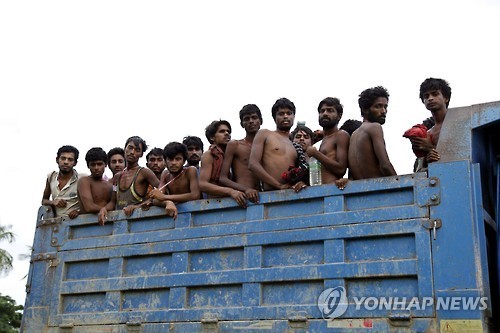The South Korean government will take in refugees from Myanmar to help them settle in the country as part of the U.N.-led refugee resettlement program, the Justice Ministry said Monday.
The ministry said that the application screening process is underway to invite 30 refugees currently taking shelter in Mae Sot, the border town between Thailand and Burma, with interviews to follow next month.
Under the application process, the government will dispatch a staff member to look through documents, conduct interviews and check identities and medical conditions.
 |
| (Yonhap) |
The move came as part of the refugee resettlement program initiated by the United Nations High Commissioner for Refugees, two years after South Korea’s refugee law took effect.
The Korean government, which became the first Asian country to enforce the Refugee Act in 2013, stipulated by law that it would accept refugees recommended by the UNHCR.
Under the program, the UNHCR relocates refugees to 28 countries, including the United States, Australia and Japan, which have agreed to grant them residence and protection to ease the burden of host countries near war zones.
Korea is the second country to join the resettlement program following Japan, which began accepting refugees from a third country in 2010.
The 30 selected Burmese refugees will be granted refugees status and F-2 visas that allow them to live and work here upon their arrival in December.
The incoming refugees will receive Korean language courses and job training for up to one year at a refugee support center until the government decides where to relocate them.
According to the government, the reasons for choosing to accept Burmese refugees, among others, were their similar cultural background and the well-established Burmese presence here, which they think will help them better integrate into Korean society.
“We will run a pilot project to admit 30 refugees every year until 2017 and see whether we will continue the program after monitoring the results,” an official from the Justice Ministry said.
“We view the Korean government’s attempt to resettle refugees as positive,” said Shin Hye-in, spokeswoman for the Korean office of the UNHCR. “Its success would depend on how Koreans embrace such a move.”
But some critics slammed the government for reaching out to refugees abroad while it is already struggling to cope with the soaring number of refugees within the country.
Yiombi Thona, a Congolese refugee and professor at Gwangju University, called the government “self-contradictory.”
“Why is the government accepting refugees only from Myanmar, giving them residence and living expenses?” Thona asked. “The plan would anger and marginalize those in Korea battling to seek asylum.”
Some 9,155 foreigners have applied for a refugee status in Korea over the past five years, but only 331 of them were recognized as refugees here, making its refugee acceptance rate 3.6 percent. The average rate for the U.N. member countries stands at 38 percent.
Kim Jong-chul, a head lawyer for the lawyers’ group Advocates for Public Interest Law, also said that refugees here are not different from Myanmarese refugees staying in the border town.
“It is a stereotype that those in the refugee camp abroad are in desperate need of help, and those seeking an asylum in Korea are not,” Kim said. “And the screening process should be more transparent, too, by engaging civic groups in the procedures.”
By Ock Hyun-ju (laeticia.ock@heraldcorp.com)

